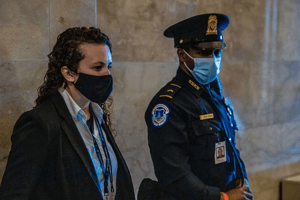If your dream job is to become a law enforcement officer then you should prepare yourself for completing something more than an application and an interview. Agencies run a series of tests and exams in order to narrow the number of police officer candidates to those who are most qualified. Then they will hire the best of the shortlisted candidates.
Since the process can be long and involve multiple steps, it is advisable to know what to expect and how to prepare properly for each application part or which are the disqualifiers that might prevent you from getting the job.
Below you will find a list of the elements and steps of the application and hiring process that you need to consider, as well as an example of the actual hiring requirements as posted by the United States Capitol Police.
What to Consider Before Applying

Before going into details about the elements of the application and hiring process, here are a few things to consider prior to applying.
1. Which are the most desired police officer qualities?
According to police expert N C Griffin there are Five I’s of Police Professionalism: integrity, intellect, initiative, industry, and impact. In other words, any police department is looking for officers who are smart, passionate, can work with different people, will not cross ethical lines and are hard-working. The ability to cope with stress is also very important for anyone pursuing a job in law enforcement.
Enrolling in a Police Explorer Program is an excellent opportunity for young people to experience the police officer job first hand. Besides, it will look good as part of their application documentation if they decide to dedicate their life to law enforcement.
2. What are the basic requirements of the agency you have chosen?
Each agency has its specific system for hiring new employees. Therefore, you need to research the basic requirements of the police department you have chosen to see if you are eligible to apply. You will get acquainted with the steps of the application and hiring process and its duration, which can be anything from several weeks to more than a year.
The most typical requirements for a police officer candidate are to be an US citizen, 21 years of age but not older than 37, to hold a valid driver’s license and have no criminal record. Each department, however, may have additional requirements.
3. Which are the common disqualifiers?
There are certain events or elements of your past that could serve as automatic disqualifiers. Any felony conviction, including deferred adjudication, less-than-honorable discharge from the military, criminal activity, drug abuse and history of drug addiction and gang membership (in most cases) fall into this category. If you have history of drunk driving, excessive traffic citations or misdemeanor, you may also not qualify for becoming a police officer.
Something more “innocent” such as tattoos may be an issue with certain agencies. Even though nowadays most police departments accept officers with tattoos, there still might be some restrictions. You might be required to wear long sleeves all year around in order to hide them and as a rule there should be no tattoos on the face or neck and they cannot be vulgar or racist. Some departments have stricter rules than others, so if it is not explicitly mentioned in the job announcement it is worthy checking it out before starting the application process.
Main Steps of the Police Officer Application and Hiring Process
Below you will find the standard procedures used by most agencies when hiring for law enforcement positions. Applicants will go through each of the steps and those who do not meet any of the elements will be removed from consideration. Those who remain will be reviewed based upon the scores they received during the scored elements of the process. Agencies will then offer jobs to the candidates on the list starting from the top and working their way down.
It is important to have a complete and accurate understanding of the process to increase your chances of getting hired. Also, failure to follow any of the steps properly can remove an applicant from consideration. Therefore, it is highly recommended that you take note of the following application and hiring process elements:
Job Announcement:
The announcement is intended to attract the most qualified candidates. It also informs potential applicants as to the minimum qualifications for the job openings so that only those who meet the minimum requirements apply for the job – More about the Job Announcement
Application Packet:
The application packet is intended to collect all necessary paperwork from the applicant in order to determine if the applicant meets the minimum requirements. It contains all documents required as part of the evaluation and hiring process – More about the Application Packet
Cover Letter/Resume:
Being able to write well is a key element for any law enforcement job. The cover letter and resume are a measure of how well the applicant writes. – More about the Cover Letter/Resume
Written Test:
A standardized test is given to all potential applicants. The written exam can be scored as pass/fail, or with a numerical scale. Passing the written test is a requirement of continuing on with the hiring process – More about the Written Test
Oral Board Interview:
The oral board Interview is where the applicant appears before a group of at least 3 members from the department, other departments, or members of the community, and is asked a series of questions. Each of the members on the board then scores the applicant’s performance. The scoring may be rated on a pass/fail basis, or rated on a numerical scale – More about the Oral Board Interview
Physical Agility Test:
The purpose of the physical agility test is only to determine if applicants have the physical abilities to perform the duties required by the job. Not every agency uses a physical agility test, and those who do will score it based upon pass/fail – More about the Physical Agility Test
Background Investigation:
Applicants who make it through the competitive hiring process and are being considered for employment will be given a background investigation. This is to validate all of the information submitted as part of the application process, and also determine if there are any “disqualifiers” which may remove the candidate from consideration. There may be a polygraph and psychological exam as part of or related to this process – More about the Background Investigation
Medical Exam:
Most agencies will have all applicants being considered for employment undergo a medical exam. Passing the medical exam is a condition of employment. The purpose of the medial exam is to determine if the candidate is medically fit for duty or has any medical condition which would prohibit them from performing necessary duties – More about the Medical Exam
Job Offer:
When an agency has decided to offer a job to an applicant, it will be based upon that all information provided by the applicant during any of the previous stages was truthful and accurate. Failure with this aspect will remove the applicant from consideration and if already hired will be cause for termination. The job offer may be contingent upon still passing a complete background investigation – More about the Job Offer
General Minimum Qualifications for the United States Capitol Police
As we have already mentioned each agency has a specific set of requirements about its new law enforcement officers. It also follows a strict procedure in testing and examining all the applicants before finally offering a job to the most successful ones. One of the common statements that you can read in regards to the employment process of any agency is that they are an equal opportunity employer. This means that all applicants will be considered without discrimination based on national origin, race, religion, sex (including marital or parental status), disability, age, or any other basis prohibited by applicable law.
Having mentioned all that, let’s have a look at the specific requirements and hiring process of the United States Capitol Police (USCP).
General Minimum Qualifications
U.S. Citizenship – Only United States citizens will receive consideration. Qualified applicants will be required to provide proof of citizenship early in the selection process.
Age Requirements – Must be 21 years of age but have not reached your 37th birthday at the time of appointment.
Education – A High School diploma or a GED certificate is required.
Valid U.S. Driver’s License – Must have and maintain a valid U.S. driver’s license that is not revoked, withdrawn, or under suspension and demonstrate responsible driving habits.
Selective Service – Must be registered with the Selective Service System; or exempt from the Selective Service System registration as a female or due to age or military status. Those with military service must provide documentation of an honorable discharge.
Background Investigation – Must complete a full background investigation.
After this list, however, there is a sentence that additional requirements may apply. Therefore, it is necessary to contact the agency personally and ask if you need further clarification.
Further on, you can see instructions on how to apply for the job. Hands down on USCP for warning candidates that the application process can be lengthy and take anything between a few months to more than a year.
Hiring process for entry-level officers
The information about the job listings continues with information where to find them and how to apply. There is a diagram of the hiring process for entry-level officers and detailed explanation of each stage on a separate page.
To give you an idea how many stages the hiring process may have, look at USCP list:
- Apply for the job – you need to check the website where the job postings are and apply as per the described directions;
- Online candidate screening (also designated as pre-employment screening) – candidates are required to submit an Authorization for Release form and additional information via a Personal History Statement (an additional questionnaire used to complete a background check);
- Assessment center – chosen candidates are invited to attend a two-day Assessment center (usually over the weekend) for an orientation session, written exam, physical readiness test and pre-employment interview;
- Gauntlet – this phase includes a polygraph, medical, and psychological examinations;
- Oral boards – those who pass the gauntlet phase go to a Behavioral-Based Interview before a panel of USCP Commanders;
- Background investigation – the final stage of the selection process includes thorough review and verification of the candidate’s employment, residential, and personal references, as well as criminal, credit history, and academic records;
- Onboarding – once the candidate receives the final job offer, they have to fill in the necessary paperwork;
- Training – you will receive specific training necessary for the job performance.
You can see from this practical example how in-depth the police officer hiring process is. Therefore, prepare yourself to face it before you start browsing the law enforcement job openings.

 Joseph Libowsky,
Joseph Libowsky,
